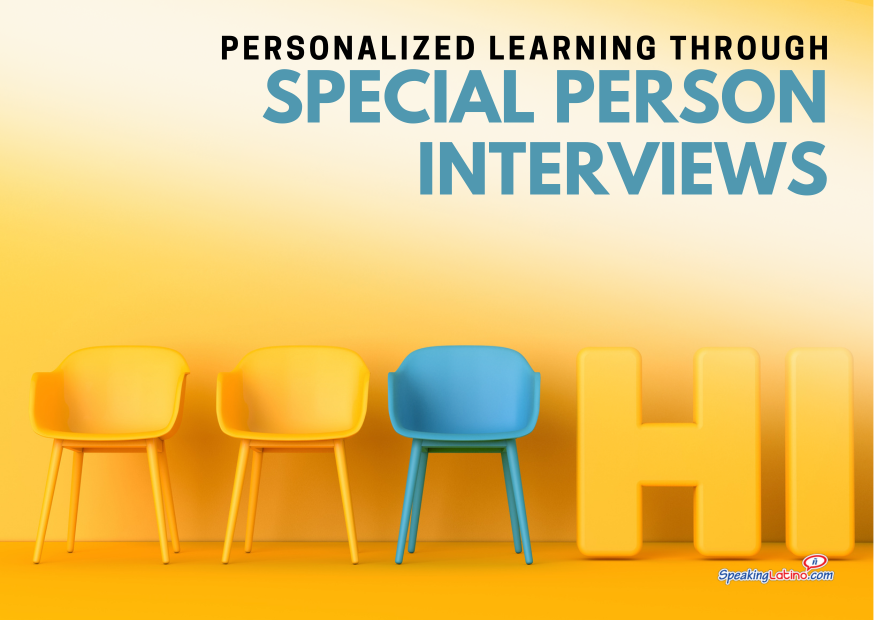
The content of this article is based on the presentation, Special Person Interviews by Bryce Hedstrom, which was part of the World Language Teacher Summit.
Enhancing Student Engagement and Language Acquisition
The art of teaching languages has evolved significantly, with a stronger impetus on creating student-centered learning environments. One transformative teaching method that has taken center stage is the use of special person interviews—a pedagogical approach designed to foster deep personal connections, enhance student engagement, and facilitate language acquisition through personalized discussions that are relevant to the learners’ lives and interests.
Building Rapport through Active Listening and Empathy
In the realm of language education, the personal connections established between teachers and students can be a potent catalyst for engagement and learning. A method akin to a hostage negotiation ladder is employed, where the foundational steps consist of active listening, displaying empathy, and progressively establishing influence. This technique paves the way for language educators to suggest alterations in attitudes and behaviors, helping students open up more and engage more deeply with the target language.
The Power of Repetition: Learning through Language Changes
Repetition plays an instrumental role in language learning, akin to the practice required to build calluses when learning to play a guitar. Regular and deliberate practice can lead to proficiency in language, much like how constant strumming leads to hardened fingertips. Adjusting language structures in Spanish, or any other language, through repetitive use, enables learners to internalize grammatical constructs and vocabulary, thereby facilitating greater fluency and confidence in its application.
Unlocking Interest: The Ikigai Challenge
The Ikigai challenge represents a novel approach to uncovering students’ interests and strengths through introspective inquiry. Derived from a Japanese concept, Ikigai stands as a framework that helps individuals discover their passion, mission, vocation, and profession. Incorporating this challenge within language classes empowers students to explore and articulate their personal drives and competencies in the target language, thus intertwining language learning with self-discovery.
Enhancing Classroom Engagement with Special Person Interviews
Special person interviews are not just an activity but a comprehensive method that fosters communicative prowess within the learners. This approach emphasizes the relevance of customizing topics to align with the individual’s interests, as seen through captivating discussions ignited by a student’s unique talent in makeup or another’s aspirations to learn a new language like French. By involving students in conversations about their lives, interests, and experiences, the language classroom transforms into a lively, engaging, and psychologically safe learning space.
Scheduling and Conducting Interviews: Student-Centered Learning in Action
A carefully planned schedule for conducting interviews and quizzes reinforces the importance of student-focused education. This strategy ensures that each student has an opportunity to be at the forefront, sharing personal stories and engaging in a dialogue that not only improves their language skills but also enriches the classroom experience for all participants.
Feedback and Engagement Strategies: The Role of Follow-Up Questions
The importance of follow-up questions cannot be overstated, as they are crucial for showing genuine interest and sustaining conversations. Techniques to engage students in class activities range from playing the part of the uninformed observer—thereby inviting corrections and deeper involvement—to having students jot down information, further reinforcing their learning. Moreover, training students to ask quality follow-up questions nurtures an environment of simplicity and engagement that proves effective even with more introverted learners.
Special Person Interviews as a Pedagogical Tool
Special person interviews serve as a dynamic instructional tool, allowing educators to delve into personalized discussions that resonate with each student. These interviews showcase not only the learner’s linguistic capabilities but also elevate their unique personalities and backgrounds, such as the poignant discovery of a student’s incorrect name in official records and the cultural insight yielded from her multilingual heritage.

Special person interviews provide students with opportunities to practice speaking in a real-life context
Social Connections and Their Impact on Learning
The social aspect of learning languages bears critical significance, drawing insights from social scientists such as Matthew Lieberman and thought leaders like Simon Sinek. Human beings are social creatures, and the integration of social connections within the learning matrix can result in enhanced memory and more profound language acquisition. By using social inputs strategically, educators can create a rich tapestry of educational experiences that resonate with the social nature of their students.
Enriching Teacher-Student Relationships: A Narrative Example
One testament to the power of special person interviews is the narrative of a small Spanish class in Breckenridge, Colorado. There, an initial misnomer sparked a therapeutic and enlightening conversation that not only corrected the oversight but also revealed a rich multilingual background, thereby facilitating an authentic celebration of the student’s linguistic prowess. This experience underlines the significance of active listening and the potent impact of follow-up questions in unlocking the stories and potential within each learner.
Teacher Training and Resource Availability
Language educators endeavoring to incorporate special person interviews into their pedagogy have resources readily available. Notably, materials for facilitating these interviews are offered in 13 languages, demonstrating the versatility and wide applicability of the method across varied language teaching contexts. Additionally, teacher training provided by experienced practitioners leverages this method’s success, advocating for language learning experiences that are engaging, enjoyable, and authentic to each student’s life.
FAQs about Special Person Inteviews
How can special person interviews help engage students in the language learning process?
Special person interviews can help engage students in the language learning process by personalizing their learning experience. By focusing on topics that are meaningful and relevant to the students themselves, such as their interests, experiences, and opinions, these interviews create a sense of connection and relevance to the language being learned. This personalization can increase students’ motivation, participation, and investment in the learning process, leading to improved language acquisition and retention. Additionally, special person interviews provide opportunities for students to practice speaking, listening, and comprehension skills in a context that is authentic and engaging, fostering a positive and supportive classroom environment conducive to language learning .
How do special person interviews enhance interpersonal speaking skills in language learning?
Special person interviews enhance interpersonal speaking skills in language learning by providing students with a platform to engage in meaningful conversations with their peers. Through these interviews, students have the opportunity to ask and answer questions, share personal experiences, and express their thoughts and opinions in the target language. This interactive exchange helps students develop their ability to communicate effectively, listen actively, and engage in authentic dialogue, thereby improving their interpersonal speaking skills. By focusing on topics that are relevant and interesting to the students, special person interviews create a context where language use becomes purposeful and engaging, leading to increased fluency, confidence, and proficiency in spoken communication .

The integration of social connections within the learning matrix can enhance memory and language acquisition
In what ways can special person interviews contribute to students’ overall language proficiency and engagement?
Special person interviews can contribute to students’ overall language proficiency and engagement in several ways:
- Personalization: By focusing on topics that are relevant and interesting to students, special person interviews make language learning more meaningful and personalized. This personal connection can increase students’ motivation to engage with the language and improve their proficiency.
- Speaking Skills: Special person interviews provide students with opportunities to practice speaking in a real-life context. By engaging in conversations with their peers about personal topics, students can improve their fluency, vocabulary, and pronunciation.
- Listening and Comprehension: Through listening to their peers during the interviews, students can enhance their listening skills and comprehension abilities. This active listening practice helps students understand spoken language in a natural and authentic setting.
- Interpersonal Communication: Special person interviews promote interpersonal communication skills as students interact with each other in the target language. This fosters a sense of community in the classroom and encourages students to engage in meaningful conversations.
- Psychological Safety: Creating a psychologically safe environment through special person interviews can boost students’ confidence in using the language. When students feel comfortable sharing their thoughts and experiences, they are more likely to take risks in their language learning journey.
- Motivation and Engagement: The personalized nature of special person interviews can increase students’ engagement with the language and their overall motivation to learn. By connecting language learning to their own lives and interests, students are more likely to stay motivated and committed to improving their language skills.
Overall, special person interviews offer a holistic approach to language learning that not only enhances students’ linguistic abilities but also fosters a positive and supportive classroom environment conducive to effective language acquisition.
Embracing Special Person Interviews for Lasting Language Learning Impact
Special person interviews epitomize a shift toward more tailored and meaningful language learning experiences. By prioritizing personalized discussions, active listening, and social connections, educators can transform the language classroom into a hub of psychological safety and student engagement. As this method gains traction, it promises to usher in a new era of language education where every learner’s story becomes a stepping stone to greater linguistic competence and cultural appreciation.